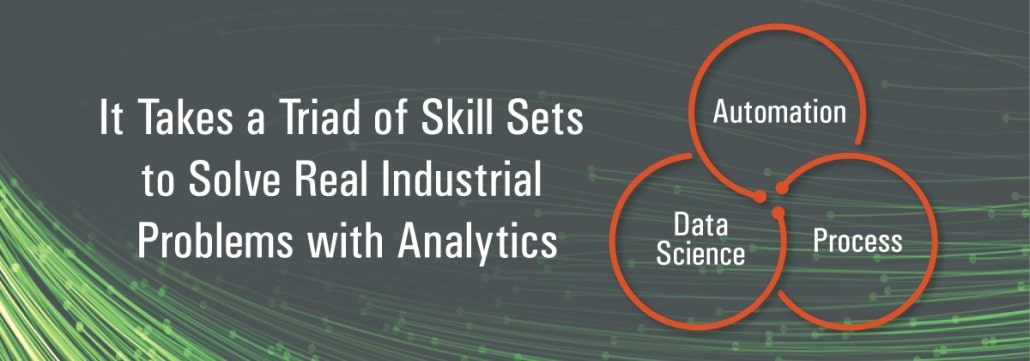I regularly advise industrial and manufacturing companies about how they can leverage modern analytics and machine learning to improve their operations, their revenue, and their profitability. I’m seeing a common pattern – where the successful deployment of analytics encounters resistance because one of three critical skill sets is either missing in the conversation or not incented to participate.
To successfully deploy intelligent analytics and achieve the desired business results, three core skill sets must be successfully melded together. It is a requirement that poses a fundamental challenge to many pursuing the technology’s potential, because the triad of essential skills is usually distributed across individuals or functional organizations that do not interact on a daily basis. Specifically:
- Automation engineers understand the data and know what data is available (and could potentially be available), and they are intrigued by the possibilities of analytics and machine learning (ML). However, they don’t necessarily deeply understand the manufacturing process or equipment, such as how to recognize that a chiller is failing, so they don’t understand all the kinds of problems that would be valuable to solve with data. These engineers would be motivated to fill data gaps or software tool gaps if only they knew which data was important for solving a problem.
- Process experts are deeply knowledgeable about the equipment and/or production processes and they know what process problems need to be solved. But they may not understand what is possible with ML and data analytics or how to use the analysis to solve problems. These subject matter experts, such as mechanical equipment specialists, equipment reliability engineers, oilfield reservoir engineers, and pharmaceutical process engineers, don’t have analytics on their priority list because their time is constrained by reacting to challenges in the production line, whether output problems, equipment concerns, or system downtime.
- ML analytics/data science experts understand the analytics and what is possible using analytics, but they don’t necessarily understand what data is available from the equipment, or what problems need to be solved. The data science skill set is more commonly found in larger organizations such as pharmaceutical manufacturing.
Keys to success
If the project is handed off to just one team in the triad, it is much less likely to be successful. To optimally deploy advanced industrial analytics, it is necessary to create a business environment that connects the islands of expertise by encouraging the groups to interact with each other. Fostering the intersection of automation, process, and ML analytics insights improves the ability to identify and prioritize opportunities to solve real problems. Providing organizational support for cross-functional projects will ensure the efforts are sustained.
Impactful insights arise from the information exchange. Automation engineers will readily seek out data that the process team says is needed. Process engineers will leap at the chance to resolve existing problems with data when they learn the automation team can make data and tools available that are easy to use. Data science teams will eagerly deploy any analytics project identified as necessary to the operation.
One great technique to accelerate collaboration within the triad of skills is to hire individuals whose experience crosses two or more of the skill sets. These individuals can serve as translators, helping to build trust between functions and accelerate the speed of iteration. Such individuals are likely to be in high demand and hard to recruit, so another creative approach is to do internal cross training – take your process engineers and have them work on the automation or data science team for a while.
If a combination of skill sets is not available internally, partnering with an external vendor can fill the void. For example, to further accelerate analytics development, consider engaging with a vendor whose expertise extends beyond data science and into process, equipment, and/or reliability engineering.
Consider the upstream oil and gas industry, for example. At Tignis we have expert data scientists who not only have PhDs in petroleum engineering but were formerly oilfield reservoir engineers. They are experts not only with the latest in machine learning, but also understand the analytics, the process, and how to use data to solve upstream business use cases.
The bottom line
When engaging in digital transformation projects around analytics, start by creating a cross-functionally funded team that includes all three pillars of expertise. It is not uncommon for industrial organizations to be deficient in one or more of the three pillars, most commonly data science expertise. When looking for external resources and suppliers to supplement your team it is best to look for organizations that have skill sets that overlap your team’s. This will ultimately improve the overall communication of the team and accelerate the time to value of your digital transformation project.








